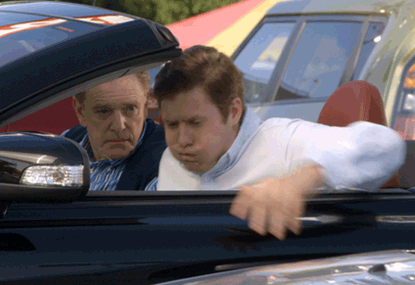 |
| Adam, Anders, and Blake |
Anders' gendered performance is more within the framework of striving to be successful and make money, which is something his father always instilled in him, and if he isn't progressing in his professional life, he is failing as a man. In season 3 episode 6, "The Meat Jerking Beef Boys," Anders drops everything he's doing when his father, Thor, announces an impromptu visit on the eve the guys plan on launching their own beef jerky business. They decide to move some of Anders things into a prop house being shown across the street. Patricia Neville states, "Male characters tend to be suspended in an ideological frame of 'masculinism' {...} the male body as a constellation of power, authority, aggression, and technology" (Neville, 235). Anders undertakes this evolution of his character from uninterested slacker (the episode starts with the three killing/ dismembering a dead horse) to self-perceived big shot (his dad takes him to the Volvo dealership to buy a new car because he 'deserves one'). When he moves into the show house, he quickly dismisses Adam and Blake telling them his dad expects a lot from him, and Anders hasn't told him that they even exist. When Anders and Thor go to the Volvo dealership, Thor tells Anders that he is proud of him, and immediately upon hearing this, Anders vomits in shock. Things don't end smoothly as Blake and Adam destroy the home when they look in Anders' wallet and realize that he went and saw G.I. Joe: Retaliation without them. At the end of the episode, Anders is forced to come clean and let Thor know that everything was a facade, ultimately relinquishing what little power or agency he did have.
 |
| Ders at the start of "Meat Jerking Beef Boys" |
 |
| Ders in his business attire, puking on his new 'Vo |
Blake is perhaps the most level-headed albeit quirky character of the bunch, and repeatedly struggles with trying to assert his masculinity. In season 2 episode 9, ironically titled, "Man Up," after Adam has a beer dumped over his head at a bar and starts to cry, Blake claims, "We don't deserve these badges of man hood we call testicles." His idea for them to reclaim their masculinity is to go on a hunting and camping trip, all while trying to figure out what exactly it is that men do. Their escapades that follow can be attributed to Atkinson and Calafell's definition of hegemonic masculinity. "{...} hegemonic masculinity as grounded in a hyper masculine ideal that emphasizes toughness, and violence as forms of power" (Atkinson & Calafell, 3). Their ideas of becoming men consist of buying a bunch of weapons, taking extra-large dips of chewing tobacco, listening to heavy metal, trying to work through their car troubles, and ultimately attempting to kill a raccoon. All of them get scared when the raccoon begins to move, but Anders kicks it in the stomach sending it flying into the side of a compactor, injuring it badly. They soon realize that the raccoon is a homeless man's pet and when he threatens them, they quickly give away the car keys. Later Blake claims, "What can I say, we're no MacGruber's, maybe this kind of stuff just isn't our Will Forte." He seems to be the only character who realizes his over exertion of masculinity is not in line with who he is, and his iteration of what a real man is, is entirely ridiculous. So much so that he has no problem going to a Rihanna concert at the end of the episode with a female coworker and lets her deal with a father who is harassing them for acting like jerks. He tries his best to assert his masculinity through power and violence, but realizes that he is no more intimidating than the raccoon that they are trying to kill.
 |
| Stalking their prey. |
 |
| Blake making some man margs |
Workaholics accurately reinforces contemporary society's ideas of hegemonic masculinity by poking fun at what masculinity once looked like through each characters individual gendered performances when looking at the characters as macho archetypes, by attempting to be like the men they perceive as the ultimate examples of masculinity. Although the characters gendered performances may be caricatures of what it means to be masculine, they are poking fun at what it once meant to be a man, possibly even on television twenty years ago, and have replaced it with a more contemporary look at the "mock-macho" situation comedy, which is something Workaholics does incredibly well.
Works Cited:
Atkinson, Joshua, and Bernadette Calafell. "Darth Vader Made Me Do It! Anakin Skywalker's Avoidance of Responsibility and the Gray Areas of Hegemonic Masculinity in the Star Wars Universe." Communication, Culture & Critique 2 (2009): 1-20. Print.
Hanke, Robert. "The "mock-macho" Situation Comedy: Hegemonic Masculinity and Its Reiteration." Western Journal of Communication 62.1 (1998): 74-93. 6 June 2009. Web. 20 Nov. 2013.
Neville, Patricia. "Side-splitting Masculinity: Comedy, Mr. Bean and the Representation of Masculinities in Contemporary Society." Journal of Gender Studies 18.3 (2009): 231-43. Taylor & Francis Online. Web. 20 Nov. 2013.
No comments:
Post a Comment
Note: Only a member of this blog may post a comment.